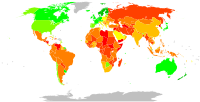
Photo from wikipedia
Abstract A substantial body of research has identified a positive relationship between women and environmental concern and much of this research suggests that a greater percentage of women in positions… Click to show full abstract
Abstract A substantial body of research has identified a positive relationship between women and environmental concern and much of this research suggests that a greater percentage of women in positions of political power should enhance environmental quality. Nonetheless, empirical analyses testing this theory are mixed at best. It is posited here that women in political power do have a positive effect on environmental outcomes, but this effect is channeled through their impact on reducing corruption. The primary hypothesis is that a greater percentage of women in positions of political power improves environmental outcomes through both an explicit, overarching effect (a greater general concern for the environment) and indirect effect (a reduction in corruption); however, the indirect effect is statistically stronger. This hypothesis is tested using a large cross-country data set in a mediation analysis and the empirical results support the hypothesized relationship between women in political power and environmental outcomes.
Journal Title: Environmental Development
Year Published: 2019
Link to full text (if available)
Share on Social Media: Sign Up to like & get
recommendations!